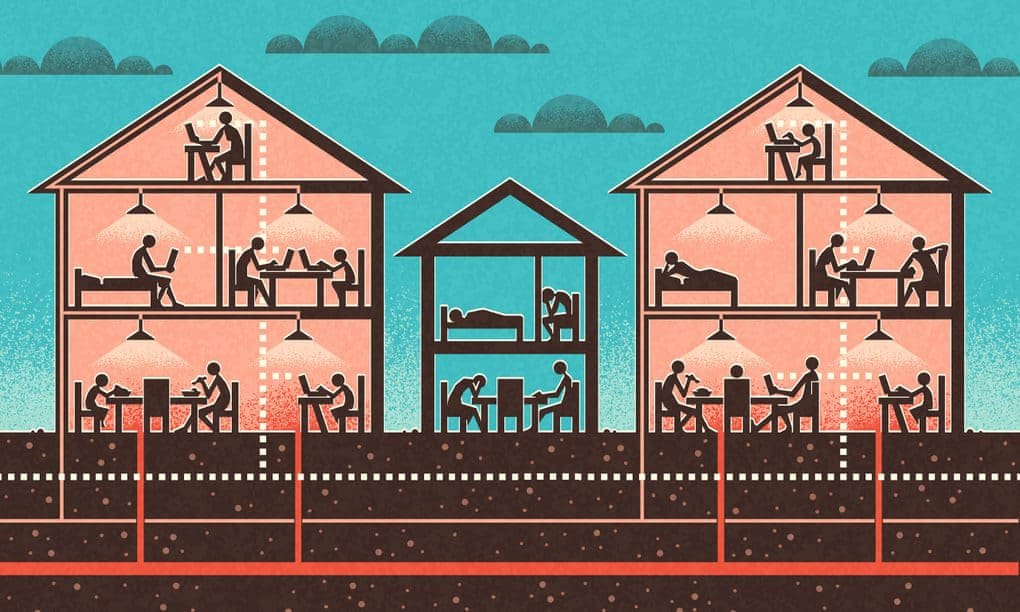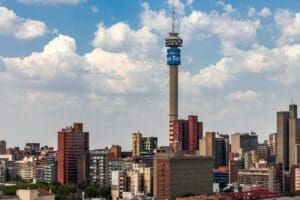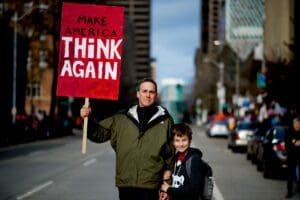The prefixes ‘food’, ‘child’ or ‘fuel’ make life for 14 million poor Britons seem easily fixable. In truth, radical action is needed
How ingenious are the British! Like the legendary Inuit people who coined 57 words for snow, we have devised a long list of clever aliases for the stuff that dominates everyday life. Know the ones I mean? Try food poverty. Fuel poverty. Child poverty. Clothing poverty. Transport poverty. Period poverty.
These are phrases mouthed in Westminster and plastered across newspapers (which, this week, are discussing “digital poverty”). They help shape the UK in the 21st century.
But this ever-growing jungle of subcategories obscures the one true problem they have in common. It is poverty: the condition of not having enough money to live your life.
If your only choice of an evening is between skipping dinner or going to sleep in the cold before waking up in the cold, then you are not carefully selecting between food poverty and fuel poverty, like some expense-account diner havering over the French reds on a wine list. You are simply impoverished.
If you are using a sock as a sanitary towel, the problem lies not in the time of the month but in your lack of income – which doubtless means you’re also not getting enough food or heating. Gas bills might jump or petrol prices soar, but if those things tip you into all-out crisis, that’s because you were already poor.
Poverty cannot be shelved tidily under different classifications, like books in a library. It jabs its tentacles into all parts of your life, distorting and defining everything from how you feel about yourself to whether you live or die in this pandemic.
“Want” was how William Beveridge referred to poverty in his landmark report of 1942. For him it was the first of five “giant evils” that had to be slain in order to rebuild a bombed-out Britain. Today, however, it is the evil that dare not speak its name. It must instead be broken down into discrete categories, all the better to tuck into Whitehall documents or charity campaign strategies. In that fake neatness lies both great political hypocrisy and huge social danger.
Cabinet ministers hate using words as simple and shaming as poverty. It’s why the welfare secretary, Thérèse Coffey, brightly refers to those forced to live on donated tins as food bank “customers”. No, far more congenial to qualify and to narrow. Oh, it’s about “cashflow problems”, as the foreign secretary, Dominic Raab, so delightfully put it. Or schoolkids not having an internet dongle.
Smaller messes take less time and money to tidy away. Whereas, according to horrified allies of Rishi Sunak this week, keeping an extra £20 on universal credit amid a historic jobs crisis would cost £6bn a year, or 1p on income tax and 5p on fuel duty. Remember, in his first budget speech last March, Sunak admitted that Tory chancellors freezing fuel duty for nine years had cost the exchequer £110bn– and then froze it for another year.
Because anything is better than admitting that this all stems from one deep structural problem: that, going into the pandemic, more than 14 million Britons – more than one in five of us – did not have enough money to live on.
Far more agreeable to dole out food parcels for a week here or there, to cut VAT on tampons, or to brief a couple of warning headlines aimed at the big energy firms.
Much better to wave around vouchers and an outsourced half-pepper than give money and power to people who have none. Because who knows what the poor might do if they were to – whisper it – choose for themselves?
This is why Coffey’s predecessor, Iain Duncan Smith, blamed the problem of child poverty not on his colleagues slashing benefits – so as to teach mums and dad that “children cost money” – but on the parents themselves being drunks and smack addicts.
In IDS’s world, the undeserving poor are always with us. The undeserving rich, such as he, on the other hand, get to marry the daughter of a baron, live in a £2m mansion owned by an obliging father-in-law, and deliver speeches to moneymen at £5,000 a time.
Such are the deep prejudices faced by campaigners down the ages. The Child Poverty Action Group was formed 56 years ago, but at the outset its activists had no special interest in child poverty. The charity’s official history states: “‘Child poverty’ was not mentioned in the minutes of meetings. As the committee members saw it, poor children lived in poor families.” But just weeks before launch: “‘Child Poverty Action Group’ was adopted as the name … as likely to win more public sympathy than ‘family poverty’, which risked inciting rightwing tabloid rants about ‘scroungers.’”
This was in 1965, several years before George Osborne was even conceived. What giant strides this country has made.
Even so, those founders were spot on. In my years of reporting on poverty and inequality, one reliable rule of thumb is that the kids are last to go without. First to starve are the mums. They’re the ones who live on hot water and toast to keep the family in meals. But the terminally prejudiced cannot bear too much reality, and it is they who set the tone of the debate.
In his recent book The New Poverty, the journalist Stephen Armstrong recounts how the Archbishop of Canterbury, Justin Welby, travelled in 2015 to Folkestone in Kent, where he met Graham and Lisa Sopp. The couple had moved there after Graham had lost his job as a security guard and Lisa was promised cleaning work. Then their new flat fell through, Lisa’s employer was taken over, and one of IDS’s benefits offices kept messing them about. Suddenly, they were sleeping in a tent on the cliffs, and Graham got very ill. They took to walking the clifftops, identifying the perfect spot from which to jump.
On meeting them, Welby observed: “There is no system in the world that will stop people having problems, but we must have a structure of support for people that meets not merely their financial needs but also their need to be treated as distinct human beings of infinite value.”
That view doesn’t fit with a system where poor people queue for bags of surplus food, collect donated clothes for their babies and beg for help with their fuel bills and housing.
The new language of poverty, so managerial and sophisticated, conceals a vast and growing baseness. However highly evolved its jargon, however lauded its campaigning footballers, Britain in 2021 treats poor people not as people – not as our family, friends, neighbours. Instead, it views them as a ragbag of different physical needs to be met by a patchwork of largely volunteer organisations. And in doing so, we deny both their essential humanity – and ours.
_____
To see original article please visit: https://www.theguardian.com/commentisfree/2021/jan/21/poverty-food-child-fuel-britons-action






















